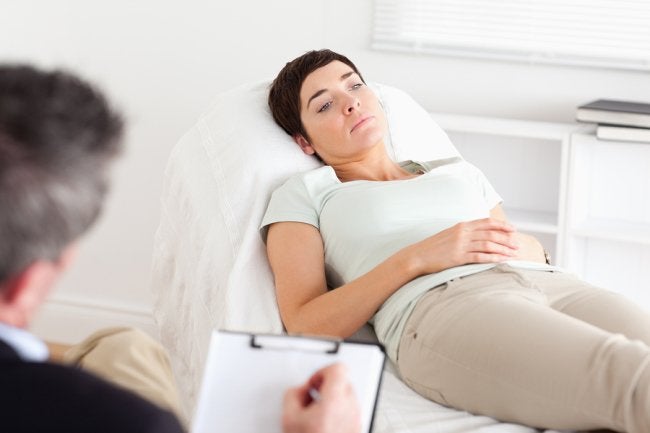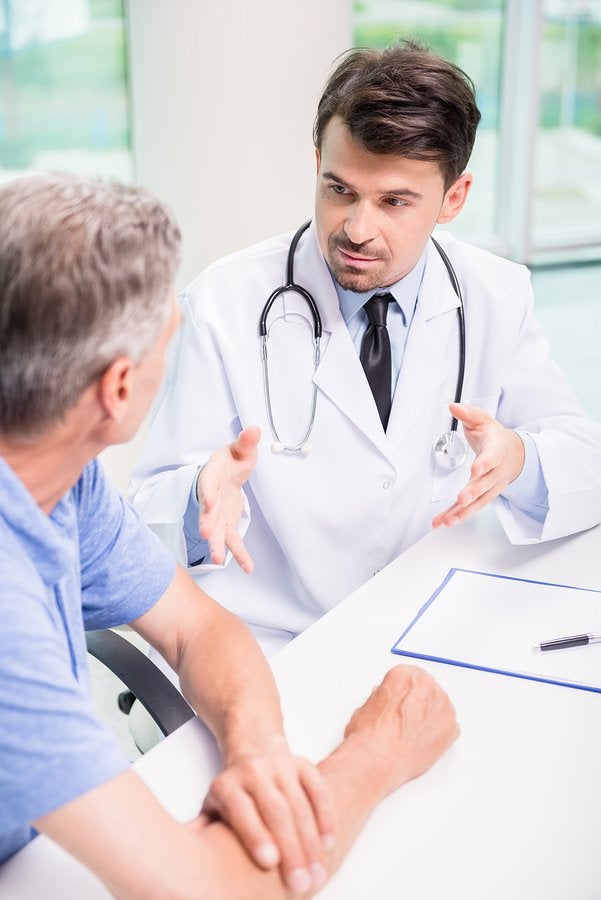-
Employment Opportunities at Urology Associates!

-
Interstitial Cystitis 101

Interstitial cystitis (IC) is a condition that affects the bladder. Women are most often diagnosed with IC, and there are currently two recognized subtypes of this condition. The majority of IC cases are non-ulcerative IC, which involves very small hemorrhages of the bladder wall. Ulcerative IC is characterized by patches of bleeding on the bladder wall. IC is a complex condition that can significantly decrease quality of life. However, patients can consult a specialist in urology to explore their treatment options.
Symptoms
The symptoms of IC can vary widely from patient to patient. For any particular patient, the symptoms can evolve over time and may develop in sudden flare-ups. Certain factors can trigger a flare-up of symptoms, such as menstruation, sexual activity, stress, and exercise. These symptoms may include chronic pelvic pain, pain between the vagina and anus, pain during sexual intercourse, and pain when the bladder becomes full. Other possible signs of IC include the urgent need to urinate and frequent urination in small amounts. It’s not uncommon for a patient with IC to urinate dozens of times per day.
Causes
Specialists in urology haven’t yet been able to determine exactly what causes IC. However, it’s thought that it may be linked to a problem with the epithelium of the bladder. If the epithelium leaks, the toxins can irritate the wall of the bladder.
Treatments
Finding the right treatment for any particular patient with IC can be difficult. What works well for one patient may be ineffective for another. Urology specialists may try combinations of treatments, including oral medications such as antihistamines, nonsteroidal anti-inflammatory drugs (NSAIDs), tricyclic antidepressants, and pentosan polysulfate. Bladder distension, nerve stimulation techniques, or the insertion of medications directly into the bladder are other treatment options for IC .
At Urology Associates, P.C., our urologists have the in-depth knowledge and extensive experience necessary to provide effective, comprehensive treatment plans for patients with interstitial cystitis. For help with IC, UTIs, kidney stones, or other urologic conditions in Tennessee, call (888) 329-7700. New and current patients can browse our website to read more about common urologic conditions and their treatment.
-
Inclement Weather Alert for January 20th, 2016.

-
What You Should Know about Kidney Stones
Kidney stones develop over time from accumulations of hardened minerals. If you experience symptoms such as severe pain in the lower back, bloody urine, nausea, and vomiting, it’s time to see a specialist in urology to be evaluated for possible kidney stones.
You can hear more about this common urology condition by watching this interview with Dr. Howard Aubert, a urologist in Nashville at Urology Associates, P.C. Dr. Aubert explains one of the non-invasive treatment options available for kidney stone patients, which involves sending high-energy sound waves through the body to break up the kidney stone without injuring other tissues.
You can rely on Urology Associates, P.C. for superior patient care and sophisticated treatment options for kidney stones, kidney cancer, erectile dysfunction, and more. Call (888) 329-7700 today to schedule a consultation with Dr. Aubert or one of our other providers.
-
A Look at Pelvic Pain in Men

Pelvic pain commonly occurs in women; however, it may also affect men. Male pelvic pain typically involves prostatitis, which refers to the inflammation or infection of the prostate gland. This common urological health condition can be troublesome; however, it is not usually associated with prostate cancer and there are treatment options available. Men who suffer from pelvic pain can request a referral to a local urologist to discuss their options.
Additional Symptoms
In addition to pelvic pain, prostatitis can cause symptoms such as painful urination, difficult urination, and frequent urination. Men may feel the urgent need to urinate and they may experience pain of the penis or testicles. The pelvic pain may be accompanied by pain in the abdomen, lower back, and perineum. When prostatitis is caused by a bacterial infection, men may suffer from flu-like symptoms. Painful orgasms can also occur.
Possible Causes
Bacterial prostatitis can develop when bacteria present in the urine get into the prostate . Other possible causes of prostatitis include nervous system disorders, immune system disorders, and physical trauma to the pelvic area. Sometimes, it is difficult for the urologist to determine what may have caused prostatitis. Some possible risk factors include engaging in rectal sex, having benign prostatic hyperplasia (BPH) or an enlarged prostate, and having recently used a urinary catheter. Men who are diabetic, those with a suppressed immune system, and those with congenital urinary tract abnormalities are at an increased risk of prostatitis, as are those who have previously been diagnosed with this condition.
Potential Treatment Options
If your urologist determines that the patient has bacterial prostatitis, he or she can prescribe oral antibiotics to treat the problem. Sometimes, men may need intravenous antibiotics and a stay in the hospital. Otherwise, men may find relief of symptoms with anti-inflammatory drugs, pain medications, and lifestyle changes.
Urology Associates, P.C. provides compassionate care for men and women with urology health problems. Men who are experiencing a condition that affects the prostate can give us a call at (888) 329-7700 to schedule an appointment with one of our urologists in Tennessee. Our clinic also provides effective treatment options for urologic cancers and erectile dysfunction.
-
Why Choose the MonaLisa Touch Laser Treatment?

After menopause, vaginal itching, dryness, and burning are common. These symptoms can lead to painful intercourse for women, who frequently don’t tell their doctors about what they are experiencing. The good news for women is that help is available. The MonaLisa Touch laser can restore your sexual health and confidence in a simple office procedure performed by your urologist.
MonaLisa Touch laser treatment is painless and performed in-office with no anesthesia, side effects, or downtime. Symptom relief occurs after just one treatment, and full results are usually achieved after three treatments. The MonaLisa Touch system triggers a healing response in the vaginal walls that increases moisture levels. This treatment is an ideal alternative to hormone replacement therapy and estrogen creams.
To find out if the MonaLisa Touch laser is right for you, make an appointment with Urology Associates, P.C. at our Women’s Institute for Sexual Health in Nashville . Schedule your appointment today by calling (888) 329-7700.
-
Knowing the Symptoms of an Enlarged Prostate

Many men develop an enlarged prostate as they age, but getting a diagnosis can take time. The more vigilant you are about the symptoms, the more likely you are to get treatment early. If you have any of these signs of an enlarged prostate, make an appointment with a urologist for treatment and to rule out conditions like prostate cancer.
Urination Difficulties
An enlarged prostate can interfere with urine flow by pressing against the urethra. This pressure makes it difficult for urine to move from your bladder out of your body. Initially, you may find that you struggle to begin urinating, and with time, you may find urination is completely restricted. Talk to a urologist if you are having difficulty urinating, because urine retention can lead to dangerous bladder swelling. Other urination problems that are associated with an enlarged prostate include a weak urine stream and nocturia—a condition with which you wake up two or more times per night to urinate.
Urinary Tract Infections
When you are unable to sufficiently empty your bladder, bacteria build up in your system, which can cause a urinary tract infection, or UTI. Having a UTI will exacerbate the other symptoms of an enlarged prostate and cause painful urination. You may also notice blood in your urine or that your urine is cloudy. UTIs can be treated by your urologist with antibiotics.
Bladder Stones
Failing to empty your bladder can also allow minerals in your urine to form crystals called bladder stones. Bladder stones can cause extreme pain and further interfere with your ability to urinate. If you have a small stone, you may be able to flush it out of your system by drinking plenty of water. Your urologist may need to prescribe additional treatments if your stone is large.
The specialists at Urology Associates, P.C. can help you find relief from your enlarged prostate symptoms, including non-surgical and minimally invasive procedures. To make an appointment with a urologist in Nashville, call us today at (888) 329-7700.
-
How the Sling Helps Treat Incontinence
Incontinence is a common problem for women. Heavy lifting and childbirth can damage the pelvic muscles and reduce the ability to control urine flow. If your urologist says your incontinence is caused by pelvic floor muscle weakness, the sling could be a solution. Watch this video to learn more.
The sling is placed under the bladder to restore lost tightness and close the area between the urethra and the neck of the bladder. This closure reduces urinary leakage. Vaginal sling surgeries are quick procedures for many patients, who often leave the surgical center the same day of the procedure.
Sling surgery is just one option provided by Urology Associates, P.C, for incontinence issues. Make an appointment with a urologist today by calling (888) 329-7700 to learn about incontinence treatment or other concerns, such as UTI treatment.
-
Different Types of Urinary Incontinence

Urinary incontinence can be a frustrating and embarrassing issue for many patients, but help is available. The first step in treating your incontinence is making an appointment with a urologist for diagnosis. There are several different kinds of incontinence, and the kind you have will dictate the best treatment approach. Here is a look at some of the most common forms of urinary incontinence.
Stress Incontinence
If you experience urine leakage when you laugh, sneeze, or exercise, you may have stress incontinence . This type of incontinence occurs when the pelvic floor muscles become weakened, allowing the pressure on your bladder to increase. Childbirth is the most common culprit behind pelvic floor muscle damage, but obesity and certain medications can also play a role. In addition, men may experience stress incontinence after prostate surgery.
Urge Incontinence
Urge incontinence is also referred to as overactive bladder, or OAB. It is typically caused by nerve damage to the bladder or other parts of the nervous system or by muscle damage and is most common in people with conditions that affect the nerves, like diabetes or multiple sclerosis. Bladder infections can also be a trigger. With urge incontinence, you will feel a frequent urge to use the bathroom and may not be able to control your bladder and make it in time.
Mixed Urinary Incontinence
Not everyone with urinary incontinence has just one form. Women in particular are likely to have both stress and urge incontinence. With mixed incontinence, your urologist may combine different treatments to resolve all of your symptoms.
If you are living with incontinence, start a conversation with a urologist at Urology Associates, P.C. today. There are a wide variety of treatments that can help you overcome your incontinence and reclaim your confidence. To learn more incontinence treatment options or to schedule an appointment, please call (888) 329-7700.
-
Exploring the Symptoms, Causes, and Treatments of Vaginismus

Vaginismus can be a significant sexual health problem for women that can impact their relationships and self-esteem. With vaginismus, the muscles in the vagina tighten or spasm upon penetration, such as during sexual intercourse or when using a tampon. Although vaginismus can be frustrating, treatment is possible. Here is what you need to know if you are suffering from this type of sexual dysfunction.
What Are the Symptoms?
Painful sexual intercourse is the most common symptom of vaginismus . The pain may subside after penetration or may persist. The pain may feel like a blockage or as though the skin is tearing. Often, women who are suffering from vaginismus have difficulty using a tampon and during pelvic exams. If you experience any of these symptoms, it is important to consult a doctor to determine the exact cause, as infections and other sexual health problems can cause similar symptoms.
What Is the Cause?
There is no single cause of vaginismus. Women who experience it often have anxiety about being sexually active; however, doctors are unsure whether the symptoms of vaginismus have triggered the anxiety or if anxiety causes vaginismus to occur. Determining the source of anxiety can be helpful during treatment.
What Treatments Are Available?
Start by making an appointment with a sexual health expert. He or she can determine the best treatment approach for you. Doing Kegel exercises, in which you learn to control the vaginal muscles, can be helpful. Your doctor may suggest inserting a finger into your vagina while doing the exercises. For anxiety associated with sexual intercourse, therapy may also help alleviate some of the symptoms.
At Urology Associates, our men’s and women’s health clinics help patients find solutions for sexual dysfunction in Tennessee, including erectile dysfunction and vaginismus. Take the first step towards reclaiming your sexual health today by making an appointment with one of our experts. Call (888) 329-7700 to schedule your visit.
Recent Posts
categories
- Uncategorized
- Bladder Cancer
- Women's Sexual Health
- MonaLisa Touch
- Urology
- Urologist
- Erectile Dysfunction
- Kidney Cancer
- Incontinence
- Prostate
- MonaLisa Touch Laser Treatment
- Kidney Stones
- Urinary Tract Infections
- Event
- Sexual Dysfunction
- Testicular Cancer
- Prostate Cancer
- Urology Surgery Center
- urinary incontinence
- vaginismus
- noncoital pain disorder
- Hypoactive Sexual Desire Disorder
- Infographic
- provenge
- Xofigo
- robotic surgery
- hormone replacement
- diabetes
- renal cell carcinoma
- pelvic pain
- hematuria
- sexual health
- chronic testicular pain
- premature ejaculation
- Men's Health Clinic
- Dr. Melvin Seard
- Interstitial Cystitis
- vasectomy
- overactive bladder
- vaginal atrophy
- nocturia
- bladder infections
- urethral strictures
- Acute Epididymitis
- low sex drive
- circumcision
- pelvic floor dysfunction
- Peyronie's Disease
- prostatitis
- female sexual dysfunction
- varicocele
- difficult urination
- low libido
- PSA levels
- male fertility
- penile prosthesis
- prostatic intraepithelial neoplasia
- male infertility
- estrogen levels
- nurse navigator
- stress urinary incontinence
- vaginal yeast infection
- elevated psa
- painful sex
- adult circumcision
- epididymitis
- OAB
- kidney infection
- penile cancer
- pelvic organ prolapse
- Vasectomy Reversal
- bone health
- cystectomies
- clinical trials
- bloody urine
- Advanced Therapeutic Center
- WISH MedSpa
- neurogenic bladder
- WISH Team
- prostate biopsies
- BPH
- fecal incontinence
- lithotripsy
- osteoporosis
- kidney cysts
